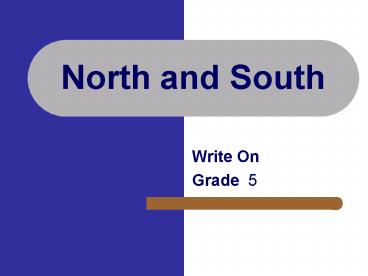North and South
1 / 21
Title: North and South
1
North and South
- Write On
- Grade 5
2
Learner Expectation
- 5.5.spi.2. recognize military and nonmilitary
leaders from the North and South during Civil War
(i.e., Frederick Douglass, Clara Barton, Chief
Justice Roger Taney, Abraham Lincoln, Ulysses S.
Grant, Robert E. Lee, and Jefferson Davis).
3
In this activity you will
- In this lesson you will learn to recognize
military and nonmilitary leaders from the North
and South during the Civil War. - You will write a paragraph about one of the
leaders and give 3 details about that person.
4
Abraham Lincoln
Lincoln thought secession illegal, and was
willing to use force to defend Federal law and
the Union. When Confederate batteries fired on
Fort Sumter and forced its surrender, he called
on the states for 75,000 volunteers.
5
Abraham Lincoln
Four more slave states joined the Confederacy but
four remained within the Union. The Civil War had
begun.
6
Frederick Douglas
- Douglas freed himself from slavery and through
decades of tireless efforts he helped to free
millions more.
7
Frederick Douglas
- He helped recruit African American troops for the
Union Army, and his personal relationship with
Lincoln helped persuade the President to make
emancipation a cause of the Civil War.
8
Clara Barton
At the outbreak of the Civil War, Barton
resigned from the Patent Office to work as a
volunteer. She advertised for supplies and
distributed bandages, socks, and other goods to
help the wounded soldiers.
9
Clara Barton
In 1862, Barton was granted permission to deliver
supplies directly to the front, which she did
without fail for the next two years. In 1864,
Barton was given the position of superintendent
of Union nurses.
10
Clara Barton
After the war, she received permission from
President Lincoln to begin a letter-writing
campaign to search for missing soldiers.
11
Ulysses S. Grant
Late in the administration of Andrew Johnson,
Gen. Ulysses S. Grant quarreled with the
President and aligned himself with the Radical
Republicans. He was, as the symbol of Union
victory during the Civil War, their logical
candidate for President in 1868.
12
Ulysses S. Grant
At Shiloh in April, Grant fought one of the
bloodiest battles in the West and came out less
well. President Lincoln fended off demands for
his removal by saying, "I can't spare this
man--he fights."
13
Robert E. Lee
The greatest land battle in the Western
Hemisphere was fought at Gettysburg, Pa., on July
1, 2, 3. The Army of Northern Virginia led by
Lee, and the Army of the Potomac led by newly
appointed General George Meade, hammered each
other.
14
Robert E. Lee
On the 3rd day of battle General Lee hoping to
end the war ordered the great frontal assault
popularly known as Pickett's Charge. After the
failure of the attack General Lee blamed only
himself, but Lee and the Army of Northern
Virginia fought on for 2 more years.
15
Robert E. Lee
General Lee surrendered at Appomatox Court House
on April 9, 1865. This effectively brought the
American Civil War to an end.
16
Jefferson Davis
- As a senator he often stated his support of
slavery and of states' rights, and as a cabinet
member he influenced Pierce to sign the
Kansas-Nebraska Act, which favored the South and
increased the bitterness of the struggle over
slavery.
17
Jefferson Davis
- On February 18, 1861, the provisional Congress of
the Confederate States made him provisional
president. His zeal, energy, and faith in the
cause of the South were a source of much of the
tenacity with which the Confederacy fought the
Civil War.
18
Abraham Lincoln at Antietam
19
Three Confederate prisoners at Gettysburg
20
"Fellow citizens, we cannot escape history."
21
Writing Activity
- Write about one of the leaders from the Civil War
and include 3 details about that person.































